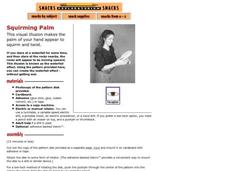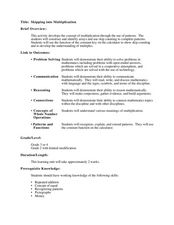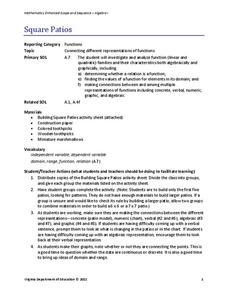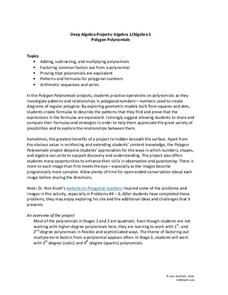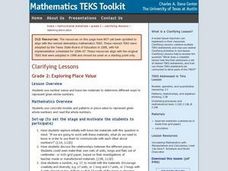Curated OER
Kodaly Beat Lesson
Introduce rhythmic beat and melodic beat with a upbeat activity that asks young musicians to clap the beat to their favorite nursery rhyme. To introduce the rest beat, class members use small drums or other percussion instruments to play...
Curated OER
Find the numerical value to letters in an addition problem
In this numerical value worksheet, learners determine the numerical value given to letter in an addition problem. The solution to the problem is provided.
University of Utah
Representations of a Line
Line up to learn about lines! Scholars discover how to express patterns as linear functions. The workbook then covers how to graph and write linear equations in slope-intercept form, as well as how to write equations of parallel and...
Exploratorium
Squirming Palm
You will need an electric drill and some Velcro™ in order to have this activity available for your class. It is, however, an intriguing display of optical illusion. After watching a spinning disk (provided), viewers look at one of their...
Curated OER
Skipping Into Multiplication
Young mathematicians study the relationship between skip counting and multiplication. They build on skip counting skills and examine arrays while studying multiplication. Resources are provided.
Exploratorium
Vocal Visualizer
Make sound visible with an activity that provides directions for how to build a vocal visualizer meant to create light patterns. Making noise into the visualizer causes a mirror to vibrate, reflecting a laser beam, and creating the...
Howard Hughes Medical Institute
Seed Dispersal in Tropical Forests
How do seeds get around? It's not like plants can control seed dispersal—or can they? Dig deeper into the amazing mechanisms of seed dispersal observed in tropical plants through interactives, a video, and plenty of hands-on data...
5280 Math
Multiplication Table Algebra
Patterns, patterns, everywhere! Young scholars examine the multiplication table to identify patterns. Their exploration leads to an understanding of the difference of squares and sum of cubes by the completion of the algebra project.
Virginia Department of Education
Square Patios
Build a patio from toothpicks and marshmallows to analyze functions! Learners look for patterns in the data as they create different size patios. As they discover patterns, they make connections between the different representations of...
Phys Ed Review
Physical Education Lesson Plan
Get active by dribbling a ball. Begin with a game of banana bunch and high five beanbag grab. Then, practice dribbling a ball, and identifying the part of the hand with which your active learners dribble. Finally, conclude with a game of...
West Contra Costa Unified School District
Writing Exponential Functions Based on Data
Give your class a concrete example of exponential growth and decay using this hands-on activity. These Algebra II lessons allow for the exploration of exponential growth and decay models, as well as the discovery of the patterns of each....
DiscoverE
Dome Home
Homes come in many different shapes and sizes. Building a model of a geodesic dome is the ultimate goal for the activity. Cutting and folding is the way to go here.
5280 Math
Polygon Polynomials
Patterns in polygons lead to patterns in polynomials. Presented with a series of polygons, individuals create polynomial expressions to represent their patterns. The algebra project consists of nine problems that incorporate polynomial...
THUP Games
Monkey Math School Sunshine
Hang out at the beach and listen to some relaxing tunes, all while developing basic math skills. An endless source of fun and learning for young children!
Exploratorium
Depth Spinner
Put a new twist on your collection of optical illusion activities. Affix the linked printable spiral to a drill, record player, or some other rotating tool. Have learners stare at the spinning disk for only 15 seconds and then look away....
Choose My Plate
My Daily Food Plan (18+ years old)
Manage your calorie intake with a daily food plan journal. After reviewing a reference sheet with suggested amounts of each food group based on a total calorie pattern, learners can jot down what foods they have eaten during the day as...
National Nanotechnology Infrastructure Network
Small Scale Sculpting: Etch Lab
Make works of art using a vintage yet effective etching strategy. The surface of a semiconductor chip has specific patterns formed through a process called etching. Through a lab investigation, young scholars recreate that process on a...
Santa Barbara City College
How to Make a Multiplication Table
Teach children how to make a multiplication table, and they'll be multiplying for life. Following this series of steps, young mathematicians learn to use patterns and the relationships between numbers to create their very own...
Curated OER
Fractions and Recipes
Learners, working with their parents in real world situations, calculate to complete three word problems associated with multiplying and dividing fractions.
Curated OER
Science: Teddy Bear Nation
Students sort teddy bears according to types and then graph the results. They each bring a bear to class and then discuss their similarities and differences. Once the bears have been sorted into groups according to size and color,...
Curated OER
Grade 2: Exploring Place Value
Creative problem solving is fun and helps kids conceptualize content. They use grid paper, manilla paper, and markers to cut, draw, and show given double-digit numbers as many ways as they can.
Curated OER
Rhythm Jam
Groups create, memorize, and perform for the class a 4 beats per measure rhythm pattern using percussion instruments including xylophones, rhythm sticks, and drums. The pattern is recorded on the worksheet provided in the resource.
American Statistical Association
What Fits?
The bounce of a golf ball changes the result in golf, mini golf—and a great math activity. Scholars graph the height of golf ball bounces before finding a line of best fit. They analyze their own data and the results of others to better...
Concord Consortium
Last Digit Arithmetic
Mathematics involves a study of patterns. The exploratory lesson has learners consider the addition pattern in different sets of numbers. Each set has a different pattern that pupils describe mathematically. The patterns involve both...





